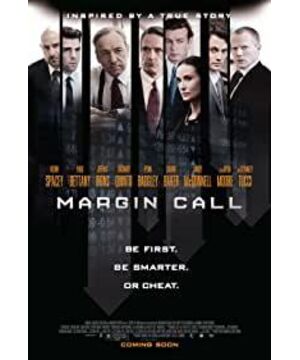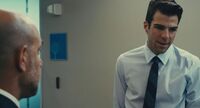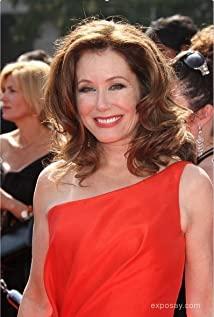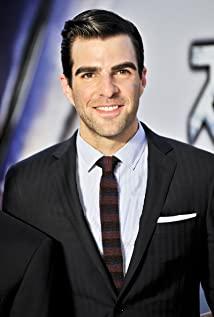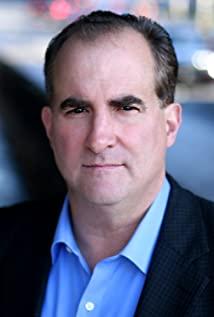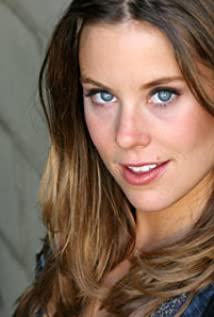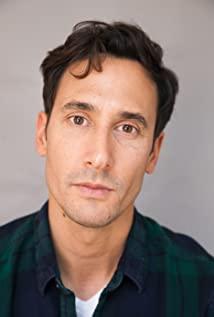I'm a financial layman, so I won't comment on the technical details, just the movie. The plot of the movie is highly dramatic, and the problem is discovered by a small head of fixed income (Stanley Tucci) who has been fired. When he fired him, the movie did not forget to play a set of efficient firing procedures in "Up In The Air", a bunch of mandarin, and then immediately expelled the person, canceling all company accounts, desk key card company He got a parking card, and immediately stopped his mobile phone, mocking the face of such institutions.
This little supervisor gave his 2-year MIT doctoral analyst (Zachary Quinto) a USB flash drive and said "Be Careful" before wrapping up the bed. After half a day of research, the MIT doctor found that the model had Wrong, all MBS are about to be shit. So we saw the emergency meeting staged overnight, and the news went through the sixth level boss-Stanley Tucci (Stanley Tucci, Paul Bettany), Kevin Spacey (Kevin Spacey), Simon Simon Baker, and in the middle is Ms Demi Moore, Head of Risk Control. At 4 a.m., a helicopter from top boss Jeremy Irons descended on the office. This paragraph very vividly reflects the working rhythm of investment banks. The process of passing through the sixth-level boss is not monotonous, but reflects the different styles of each boss.
Then the big boss communicated directly with the bottom analysts in an emergency meeting, and then made the decision to dump all MBS before anyone knew. Is there any moral problem in selling something you know will be worthless at the current market price? The big boss thinks that this is for the survival of the company, and it is understandable to sell things at market prices to those who are willing to buy them. And Sam (Kevin Spacey) goes toe-to-toe with the big boss, believing it pushes his bottom line. I personally think that the boss's decision is justifiable from a commercial point of view as it is in the interest of the business and is not illegal and probably not against professional ethics. Of course, left-wing Hollywood filmmakers will not tolerate it.
Then the pace of the plot slows down, and the focus is on whether Sam is following his own bottom line or the boss's pressure on him. Also interspersed in it are episodes of Sam's life as a man who has worked in the financial field for 34 years, lonely, disillusioned, divorced, and the closest to him is a dog who is about to die of illness. By the way, I also mentioned the sadness of the junior analyst who was about to be fired just after he joined the company.
There's another climax at the end of the film, Kevin Spacey's speech to traders at the start of the devil's day. He gave full play to Kevin's introverted, profound and sophisticated acting skills, and integrated the company's interests, the boss's orders and personal opinions, as well as his understanding of his subordinates, and the performance was convincing. Afterwards, the MBS that could make the company go bankrupt was sold out in one day. I don't know if this is a Hollywood genius or it is really feasible. At the end of the day, the company fired all of the traders after rewarding them with a hefty sum of money. Finally, don't forget to hit Wall Street, who cares nothing for money.
The film ends with the sound of Sam digging the grave of the pet dog, which seems to imply the fate of this industry or the perception of the industry in the literary and art circles. The literary and art world has always had a lack of goodwill towards Wall Street, and this year's Best Documentary Oscar-winning "Steal Yourself" reflects this, but the conclusion based on this righteous indignation is, to a certain extent, one-sided. The key to blame is not the morality of Wall Streeters, but the unbalanced relationship between the financial industry and the real economy.
Summarize the movie. Some people say that it is wonderful, and after watching this film, I decisively gave "Wall Street" and "Wall Street 2" one star. I don't agree with it. It is true that this film truly reflects the working state of investment banks and tells a story that everyone is concerned about recently, but in the end, this story is just one sentence. When the building is about to collapse, an investment bank throws shit overnight. Such a simple plot, flat characters (there is no wonderful portrayal of Sam, the big boss, and analysts), general technical content (the reason why MBS becomes shit is fooled, and it may not be understood by ordinary audiences) Although the performance is compact enough, it is incomparable with the complicated business warfare methods of "Wall Street" in 1987, the profound depiction of several characters and human nature, and the contradiction between family affection and interests, as well as the contradiction between right and wrong and interests. of. Of course, it's still better than the "Wall Street 2" that put the cart before the horse.
But a very valuable point of this film is that there are some scenes in which people speak from the perspective of investment bankers. For example, when Paul Bettany was driving with his younger brother, investment bankers and ordinary people are actually closely related. They may have a high income, but they think their contribution to ordinary people's life deserves such a high income. This is something that neither "Wall Street" nor "Steal Yourself" mentioned.
Speaking of characters and actors, although Kevin Spacey has superb acting skills, the contradictions of this character in this film are relatively simple, and the other characters are basically flat characters showing temper. Ms. Demi Moore's acting skills are still average, and she has no investment banking style at all. Jeremy Irons is full of aura, but sometimes she is still a bit like a badass boss rather than an investment bank boss. It is a pity that this film is mainly documentary, and there is no such vivid character as Michael Douglas in "Wall Street".
Recently, I am seriously studying the book "Understanding Movies". Here is a screenshot to practice my hands:
[See the picture at http://www.saoyuying.com/2011/12/margin-call/ ]
This is a medium shot of two people (the film has a lot of medium shots due to a lot of opponent scenes, and there are many over-the-shoulder shots to express a sense of oppression), the two characters are from side angles, and the angle of the camera is also horizontal Height is the angle from which the audience can objectively observe the characters without substituting them into the emotions of the characters. The distance between the two people is social distance, showing their psychological distance, and this shot is a closed structure in composition, all elements are within the frame, and the window frame in the background frames the two people separately, showing the two. People are in trouble. The window lattice in the middle shows that the two are psychologically isolated. So you don't have to listen to the dialogue to know that their thoughts are going together. The one on the left has something to eat, and the one on the right is empty. Although this is a plot arrangement, it can also imply that the one on the left finally got all the benefits.
WeChat public account: feidududu watching movies (feidudumovie)
View more about Margin Call reviews


